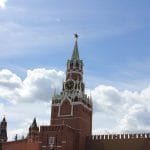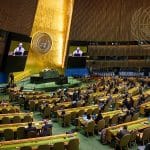In the latest phase of Bosnia’s seemingly never-ending battle over competencies, members of the National Assembly of Republika Srpska in Banja Luka voted on February 10 in support of creating a separate high judicial and prosecutorial council that would not be accountable to the central government in Sarajevo. The draft is not final at this time, as it has now entered a 60-day public-discussion process after which Republika Srpska deputies must again discuss and approve the final version.
As it now stands, the draft law stipulates that the proposed council will be able to elect judges and prosecutors within the Republika Srpska, as well as determine their powers and jurisdictions.
Direct conflict with the Dayton peace accords
This separatist document puts the new draft in direct conflict with existing rules flowing from the 1995 Dayton Accords. Currently, the High Judicial and Prosecutorial Council of Bosnia and Herzegovina — formed in 2004 after being agreed upon by the governments of the country’s two entities – is tasked with electing judges and prosecutors across the entire country.
Readers will recall that the 1995 Dayton accords established the country’s current political structure. Bosnia and Herzegovina consists of two entities — the Republika Srpska (Serb Republic) and the Bosniak-Croat Federation — and maintains a central government that ties both together in a fragile state, almost constantly under challenge by separatists.
The latest action is another step in moves by the ruling parties in the Republika Srpska to transfer power from the state level to the entity level. Under the Dayton Accords, changes of this type require approval by the state members of the steering board of the Peace Implementation Council (PIC) under the Office of the High Representative, considered essentially impossible.
Nevertheless, Milorad Dodik, the Bosnian Serb representative in Bosnia’s tripartite presidency, seems determined to push the envelope over the issue of competencies as far as possible. Tensions have risen sharply in recent months over a series of Dodik steps seen as secessionist and inflammatory by the international community.
Sanctions – real or under planning
While the EU openly warned Dodik of sanctions in early January, Washington actually imposed direct sanctions on January 5 on Dodik for corruption and threatening the stability and territorial integrity of Bosnia.
According to Reuters, the EU has prepared a preliminary document for a scheduled February 21 discussion regarding the situation in Bosnia, laying out possible sanctions options. Among the items under consideration would be travel bans, as well as EU aid and personal financial asset freezes.
Internal debate is clearly intensifying. Germany has already called for sanctions on Dodik, but Hungary has argued that such measures might be counterproductive since Brussels hopes to bring Bosnia and five other Balkan countries eventually into the bloc.
Finally, the European Parliament adopted on February 17 an amendment calling for sanctions against Bosnia and Herzegovina Presidency member (Serbian) Dodik. Strongly supported by the EPP, the vote passed with 504 MEPs voting yes, 93 MEPs against, and 72 abstaining.
Will the EU order sanctions on the Republika Srpksa?
With the world focused on the Ukraine crisis, Bosnia’s Serbian separatists push aggressively to strengthen their position
Wikipedia.org/public domain map

Republika Srpska map (area in red)
- Advertisement -
- Advertisement -







